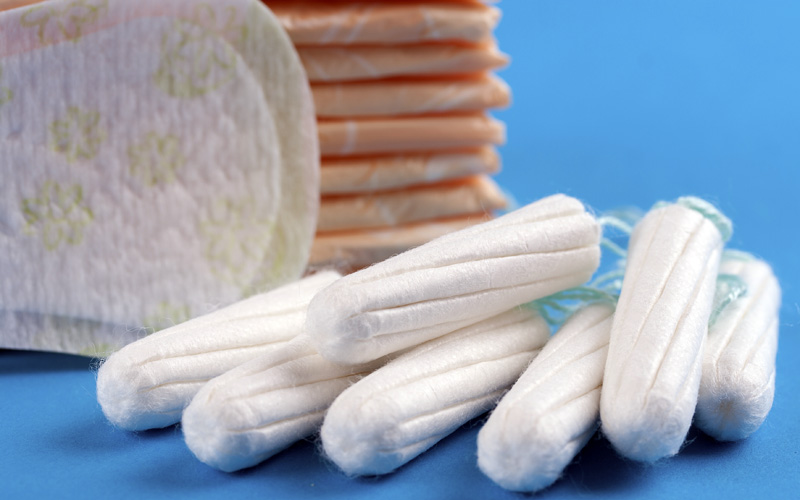
by guest blogger Erin Switalski, executive director of Women’s Voices for the Earth
I’m impressed to see all of these fun and empowering ads for tampons and pads lately. From Hello Flo’s viral First Moon Party to P&G’s tear-jerking Like a Girl, these videos are giving the subject of menstruation a lot more serious attention than it used to get. But one topic that still hasn’t been broached is the unpleasant subject of what exactly it is that women are putting into and onto their most sensitive parts with these products.
An analysis by Women’s Voices for the Earth of product labels found at least 20 chemicals of concern in some feminine products. These include: parabens (preservatives linked to endocrine disruption, increased risk of breast cancer, and allergic rash); DMDM Hydantoin, a preservative that releases the carcinogen formaldehyde; and benzethonium chloride, a chemical linked to maternal and embryo toxicity that isn’t supposed to be used on mucous membranes (of which there are many in the vagina).
Additionally, scented tampons and pads are infused with fragrance, which could be made up of combinations of any of nearly 3,000 different chemicals Examples of potentially harmful chemicals that can be found in fragrance include cancer-causing chemicals like styrene, pyridine, methyleugenol, and butylated hydroxyanisole; phthalates of concern (DEP and DINP), which are linked to reproductive problems and cancer; synthetic musks (potential hormone disruptors); and numerous allergens. The fact is that tampons, pads, feminine washes, wipes, sprays, douches, and other feminine-care products can contain a host of chemicals that I certainly don’t want “down there”—and sadly, they are woefully under-regulated, even though they are being used on some of the most absorptive tissues in the body.
Let’s start with a quick anatomy lesson. The walls of the vagina are filled with numerous blood vessels and lymphatic vessels, which allows for direct transfer of chemicals into the circulatory system. In fact, the vagina is so absorptive that drug companies are interested in pursuing it as an alternative avenue for drug intake. One study found that a vaginally applied dose of estradiol (an estrogen proxy) resulted in systemic estradiol levels in the body 10 to 80 times greater compared to those found when the same dose is given orally. Given this, one would think that the Food and Drug Administration (FDA) is making sure there are no harmful chemicals in products that are designated for use in the vaginal area. But this isn’t the case.
Tampons, pads, and menstrual cups are regulated as medical devices. There is no pre-market testing or even ingredient disclosure required for these products. Other products, such as washes, wipes, sprays, and douches, also fall under the jurisdiction of the FDA, but they are classified as personal care products and are subject to the Food, Drug and Cosmetics Act. That law was originally passed in 1938, and despite some updates over the years, it’s still miserably inadequate. It doesn’t require any safety testing of individual products or ingredients, and doesn’t even require manufacturers to share their safety information with the FDA. While companies are required to disclose ingredients, they are exempt from disclosing the components of their fragrance.
The bottom line is that no one has really looked into the potentially grave health impacts that the use of toxic chemicals in feminine products could have on women. Until now.
In May, Congresswoman Carolyn Maloney (D–N.Y.) introduced the Robin Danielson Act of 2014, a bill that would require more research and regulation of chemicals in products used to control menstruation (tampons, pads, cups, and such). As Maloney’s office stated in the National Journal, “‘[t]he biggest hurdle has been the unwillingness of lawmakers to broach what could be considered an uncomfortable subject…[t]his is not exactly something congresspeople want go to the floor and talk about.'” Perhaps that’s because Congress is made up of more than 80 percent men.
But women want to talk about this. They want to know their products are safe, and they are calling on companies to make needed changes. Joining the lineup of amazing videos is Detox the Box, a hilarious spoof of the SNL skit “Dick in a Box.” The video raises the question of what exactly is in the products women use every month and calls on industry leaders Tampax and Always to disclose their ingredients and take the harmful ones out.
So, women out there, watch and share. Because it’s time to put the issue of toxics in products into the forefront of menstrual health conversations. It’s time to Detox the Box.
 Erin Switalski has worked as a social justice and environmental health advocate for more than 15 years. She is the executive director of Women’s Voices for the Earth (WVE), the only women-led environmental health organization focusing on eliminating toxic chemicals from the products women encounter every day. The organization is committed to building alliances that engage diverse communities and address the concerns of those most affected by toxic exposures. Erin is a 2010 winner of the “40 under 40” Leadership Award in Advocacy from the New Leaders Council. She is also featured in the 2014 Link TV special, UNSAFE: The Truth Behind Everyday Chemicals. Erin regularly speaks about the power of women to move major corporations and influence policy.
Erin Switalski has worked as a social justice and environmental health advocate for more than 15 years. She is the executive director of Women’s Voices for the Earth (WVE), the only women-led environmental health organization focusing on eliminating toxic chemicals from the products women encounter every day. The organization is committed to building alliances that engage diverse communities and address the concerns of those most affected by toxic exposures. Erin is a 2010 winner of the “40 under 40” Leadership Award in Advocacy from the New Leaders Council. She is also featured in the 2014 Link TV special, UNSAFE: The Truth Behind Everyday Chemicals. Erin regularly speaks about the power of women to move major corporations and influence policy.




If men had monthly periods and needed these same products, there would be all kinds of rules and regulations to be sure they didn’t harm ‘their’ private parts. I find it so stupid that men can’t handle discussions on safe health products for women because it’s something they don’t want to talk about. Would they rather talk about the cancer and/or death of their wife and daughters, granddaughters?? Are they more comfortable with sickness and death then with making sure corporations don’t make a huge profit from harmful, dangerous products for the women in their life? Maybe the only way we can get healthy feminine products on the market is to make sure that Congress is 80% women!!
Why not talk about organic brands and where to purchase? I’ve seen them.
continuously i usedd to read smaller articles whicfh as
well clear their motive, and that is also happening with this post whichh I am reading here.
I’m just wondering what do you suggest then? I’ve been thinking about getting a cup, but are there chemicals in that too?